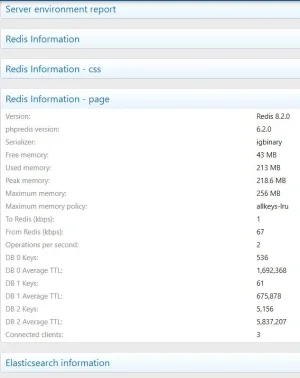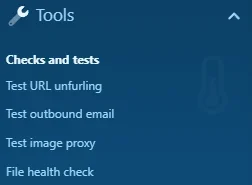You are using an out of date browser. It may not display this or other websites correctly.
You should upgrade or use an alternative browser.
You should upgrade or use an alternative browser.
Redis Cache By Xon 2.18.8
No permission to download
- Thread starter Xon
- Start date
If you're using Xon's addon, use his recommended settings in the FAQ.
A lot of configuration in there. For example this is my own config but I'm not sure it's perfect or not:
Code:
// === Redis main cache ===
$config['cache']['enabled'] = true;
$config['cache']['provider'] = 'SV\RedisCache\Redis';
$config['cache']['namespace'] = 'xf';
$config['cache']['config'] = [
'server' => '127.0.0.1',
'port' => 6379,
'password' => null,
'database' => 0,
'timeout' => 2.5,
'read_timeout' => 2.5,
'connect_retries' => 1,
'persistent' => false,
'force_standalone' => false,
'serializer' => 'php',
'use_lua' => true,
'lifetimelimit' => 2592000,
'compress_data' => 1,
'compress_threshold'=> 20480,
'compression_lib' => null,
'retry_reads_on_master' => true,
];
// === Guest page cache ===
$config['pageCache']['enabled'] = true;
$config['pageCache']['lifetime'] = 600;
$config['cache']['context']['page']['provider'] = 'SV\RedisCache\Redis';
$config['cache']['context']['page']['config'] = [
'server' => '127.0.0.1',
'port' => 6379,
'password' => null,
'database' => 1,
'timeout' => 2.5,
'read_timeout' => 2.5,
'connect_retries' => 1,
'persistent' => false,
'serializer' => 'php',
'use_lua' => true,
'compress_data' => 1,
'compress_threshold'=> 20480,
];Thats definitely not a default config. Why over complicate it?
Is it enough? I just want some performance as you know...
Code:
$config['cache']['enabled'] = true;
$config['cache']['provider'] = 'SV\RedisCache\Redis';
$config['cache']['config'] = [
'server' => '127.0.0.1',
'port' => 6379,
'database' => 0,
];
$config['pageCache']['enabled'] = true;
$config['cache']['context']['page']['provider'] = 'SV\RedisCache\Redis';
$config['cache']['context']['page']['config'] = [
'server' => '127.0.0.1',
'port' => 6379,
'database' => 1,
];Why not just something simple like:
Change your serializer if you don't have the igbinary installed.
add page cache if needed.
Code:
$config['cache']['enabled'] = true;
$config['cache']['sessions'] = true;
$config['cache']['provider'] = 'SV\RedisCache\Redis';
$config['cache']['config'] = [
'server' => '127.0.0.1',
'port' => '6379',
'database' => 0,
'compress_data' => 3,
'use_lua' => true,
'serializer' => 'igbinary',
'compress_threshold' => 20480,
];Change your serializer if you don't have the igbinary installed.
add page cache if needed.
This.A bit out of my depth to be honest. I use igbinary because I thought it had the best performance/balance. But yeah, bit out of my depth to comment. Perhaps @Xon can comment?
I switched to igbinary because in my research it can and does need less ram (my vps is ram challenged). I was able to lower my maxmemory. I also use maxmemory-policy allkeys-lru as during my research that was best when using Redis for cache. Who knows, maybe I'm wrong. That is why I commented out the PHP and the maxmemory settings I had and can switch back quickly. Can't wait to see what @Xon says.
Last edited:
The
The
igbinary serializer is preferred as it typically performs better when decoding which is what happens the majority of the time.The
phpredis extension implements the redis protocol in C which generally performs better, but with v8.0+ the performance different is actually fairly margin now days.These are fairly complicated, and well outside what I offer for free support as "It Depends". And without customized support and testing, it is hard to determine anything besides that.Should I use replicas or sentinel etc.
Thanks for the info @Xon . This is what I ended up with after switching from PHP. Significantly less ram. I'm slowly reducing maxmemory as it runs and I look at peak.Theigbinaryserializer is preferred as it typically performs better when decoding which is what happens the majority of the time.
Thephpredisextension implements the redis protocol in C which generally performs better, but with v8.0+ the performance different is actually fairly margin now days.
These are fairly complicated, and well outside what I offer for free support as "It Depends". And without customized support and testing, it is hard to determine anything besides that.

Last edited:
The Redis information block is currently shown to all administrators.
This does contain some sensitive information (Redis version, etc.) and might not be relevant anyway for administrators with limited permissions.
Could this be changed so the block is only shown to administratos with permission
This does contain some sensitive information (Redis version, etc.) and might not be relevant anyway for administrators with limited permissions.
Could this be changed so the block is only shown to administratos with permission
serverInfo on XF 2.3.4+?If you have admins you trust so little that you don't want them to see your redis version... You've got much bigger problems than hiding that display.The Redis information block is currently shown to all administrators.
This does contain some sensitive information (Redis version, etc.) and might not be relevant anyway for administrators with limited permissions.
Could this be changed so the block is only shown to administratos with permissionserverInfoon XF 2.3.4+?
This statement IMHO demonstrates lack of common sense for security 
 en.wikipedia.org
en.wikipedia.org
It doesn't really matter if I trust admins or not, displaying this information is not necessary for admins with limited privileges and it therefore should not be shown to reduce possible attack vectors - especially as XenForo introduced a new permission in 2.3.4 to address this.
Principle of least privilege - Wikipedia
It doesn't really matter if I trust admins or not, displaying this information is not necessary for admins with limited privileges and it therefore should not be shown to reduce possible attack vectors - especially as XenForo introduced a new permission in 2.3.4 to address this.
I created a user, made them an administrator, but did not give them any admin permissions.
The user can still see the following:

I need to provide a clean admin UI to some of my non-technical staff to undertake specific administrative tasks on the site using custom functionality I'm building into my application - but there is no way to remove these menu options (template modifications won't work) and they should not be seeing any technical information or functions while there.
I'm assuming if I manually change the admin permissions for these navigation items, they will...
The user can still see the following:

I need to provide a clean admin UI to some of my non-technical staff to undertake specific administrative tasks on the site using custom functionality I'm building into my application - but there is no way to remove these menu options (template modifications won't work) and they should not be seeing any technical information or functions while there.
I'm assuming if I manually change the admin permissions for these navigation items, they will...
- Sim
- Replies: 13
- Forum: Resolved bug reports
Xon updated Redis Cache By Xon with a new update entry:
2.18.3 - Bugfix update
Read the rest of this update entry...
2.18.3 - Bugfix update
- php 8.4+ compatibility fixes
- For XF2.3.4+, check "View server information" admin permission when viewing redis information
Read the rest of this update entry...
Question. I'm building a video game release calendar that's pretty much complete aside from a few odds and ends. It pulls in release dates via IGDB API and caches the JSON results in internal_data. Is there any real world benefit to caching this with Redis if available?
Last edited:
Xon updated Redis Cache By Xon with a new update entry:
2.18.5 - Performance update
Read the rest of this update entry...
2.18.5 - Performance update
- Fix caching forum totals support when a date limit filter or 'Thread list date limit' is set on the forum
- Improve compatibility with Known Bots add-on
- Add caching for "Online statistics" block as this query becomes unexpectedly expensive as the user-count skyrockets
Read the rest of this update entry...
I think your latest update has a version mismatch or something. I keep getting updates from the XF addon update notifier add-on, but no update exists.
View attachment 327613

Similar threads
- Replies
- 0
- Views
- 80

